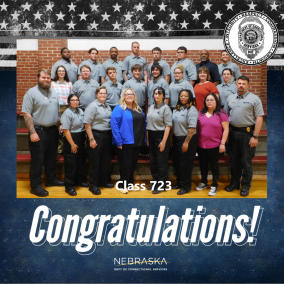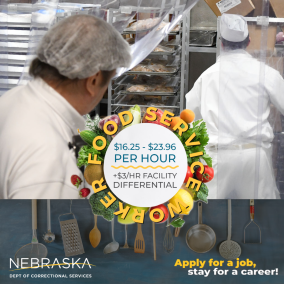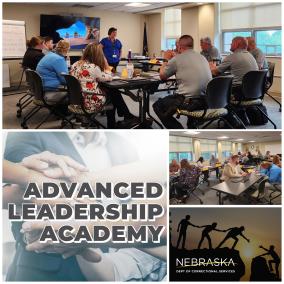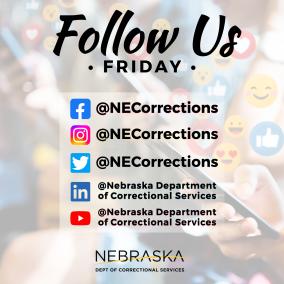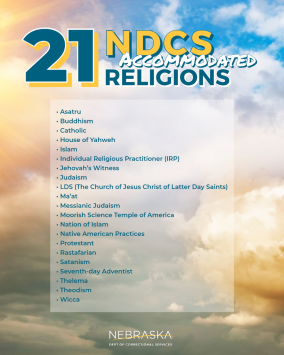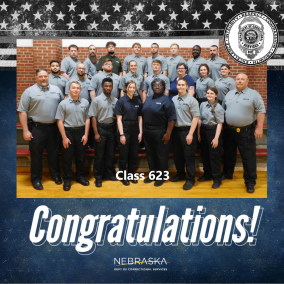|
7 Habits on the Inside |
Developed by FranklinCovey in cooperation with the Colorado Department of Corrections, 7 Habits on the Inside uses the principles of the 7 Habits of Highly Effective People, tailored for the incarcerated individual. The program seeks to empower individuals to manage their own lives in such a way as to be successful in prison and in the community and using the principles of integrity, proactivity, and other key skills. (12 weeks)
Needs Addressed: Attitudes/Behavior; Family; Employment; Life Skills
|
Non-Clinical Programs |
|
AA (Alcoholics Anonymous) |
AA (Alcoholics Anonymous) is an organization which encourages members to read, and listen at meetings using the program as an opportunity to face the truth and become accountable for their addiction to alcohol.
Need Addressed: Support for addiction and prosocial activity
|
Pro-Social Activities |
|
ABC Virtual Electric |
Introduces concepts of basic electrical wiring, presented by classroom instruction, along with hands-on experience by working with virtual electrical panels.
Need addressed: Employment
|
Vocational/Life Skills Programs |
|
ABC Applied Construction Math |
This program provides learning in the area of construction math such as division, decimals/percentages, reading measurements, calculating area, linear measures, angles, volume, solving for the unknown.
Need Addressed: Employment
|
Vocational/Life Skills Programs |
|
ABC Construction Virtual Welding |
Provides training in welding safety, basic welding information and welding defects. Will give participants the tools to make welding corrections.
Need addressed: Employment
|
Vocational/Life Skills Programs |
|
ABC Construction: OSHA Construction |
This program provides an overview of safety applications on a construction site as well as training on governmental regulations.
Need Addressed: Employment
|
Vocational/Life Skills Programs |
|
ABC Core Curriculum |
This program introduces basic construction safety; construction math, hand tools, power tools, construction drawing, rigging; communication skills; employability skills, and material handling.
Need addressed: Employment
|
Vocational/Life Skills Programs |
|
ABC OSHA General Industries |
This course provides entry-level information about employee rights; employer responsibilities; how to file a complaint; how to identify and prevent job related hazards.
Need Addressed: Employment
|
Vocational/Life Skills Programs |
|
ABC Trades Curriculum Courses |
ABC Currently offers accelerated or four year trade courses in electrical, plumbing, welding, HVAC and carpentry. Selected candidates for this program will be interested in the trade as a career. Trainees will work with journeymen and will receive help with finding employment in the industry.
Needs addressed: Employment
|
Vocational/Life Skills Programs |
|
Adult Basic Education |
Builds basic skills for GED testing, college readiness and/or skill development.
Need Addressed: Education
|
Education Programs |
|
Adult Secondary Education (ASE) |
Assists students prepare for taking the high school equivalency test (GED).
Addresses Need Area: Education
|
Education Programs |
|
Alternatives to Violence Project (AVP) |
The Alternatives to Violence Project (AVP) is a workshop that provides insight on anger and relationships; and new ways to address disagreements.
Needs Addressed: Attitudes, behavior, family, friends, employment
|
Non-Clinical Programs |
|
Assistance for Social Security Application |
Social workers provide assistance in obtaining and completing Social Security applications to individuals who qualify and are 90 days from discharge, post-release supervision or parole.
Need addressed: Re-entry for those who may qualify for Social Security benefits due to age or disability.
|
Reentry Services |
|
Career Readiness |
Helps individuals identify a specific career path; learn professional and personal skills to assist them in getting a job.
Need addressed: Employment
|
Vocational/Life Skills Programs |
|
Choice, Change Consequence |
A domestic violence program focused on developing new thinking in the development of relationships.
Addresses domestic violence referrals
|
Clinical Treatment |
|
Clinical Treatment Programs |
See clinical programs list for more details.
|
|
|
College correspondence |
Opportunity to pursue college coursework through individual and family support.
Need addressed: Education, employment.
|
Education Programs |
|
Community Coordination |
Social workers coordinate with a variety of community providers and agencies for mental health services, substance abuse treatment and medical services. Providers include the Veteran's Administration, DHHS, treatment agencies, private practice and non-profit organizations.
Needs Addressed: Housing, medical, mental health, basic needs, re-entry.
|
Social Work Services |
|
Computer based Education and Training |
Certificate program utilizing tablets for improvement in academics and job training.
Need addressed: Education. employment
|
Vocational/Life Skills Programs |
|
Continuing Care-Sex Offender Program |
This program helps participants maintain and strengthen the gains they made in other treatment programs. It also helps participants navigate new challenges and helps support the transition back to a community setting.
Needs Addressed: Sex Offender conviction
|
Clinical Treatment |
|
Crisis Intervention |
Provided on an as-needed basis, clinicians are available to assist individuals in a mental health crisis.
Needs Addressed: Mental health.
|
|
|
Department of Labor Workforce Development |
Helps participants develop a resume, prepare for interviews and work on job skills.
Need area addressed: Employment
|
Vocational/Life Skills Programs |
|
Destination Dads Parenting Workshop |
Provides parents with techniques that will aid them in building good family relationships, prevent and correct misbehavior, use consequences to improve behavior, teach self-control, and staying calm.
__________________________________________________________________________________-
Need addressed life skills/parenting
|
Vocational/Life Skills Programs |
|
Dialectic Behavior Therapy (DBT) |
Cognitive-Behavioral Treatment that helps participants develop mindfulness-based coping skills to decrease suicidal and self-harming behaviors.
Needs Addressed: Mental Health
|
Clinical Treatment |
|
Discharge Planning |
Reentry specialists work with individuals to ensure a reentry plan is completed. The plan allows for a smooth transition to the community and focuses on housing, transportation, employment, education, and medical/mental health services as needed.
Need addressed: Re-entry
|
Reentry Services |
|
EMPWR |
A gender responsive trauma informed care program created to provide tools to move beyond the cycle of addiction an abuse, become self-confident, self controlled, self-directed and self-empowered.
Need addressed: Attitude/behavior
|
Non-Clinical Programs |
|
ESL/ELL |
English as a second language (ESL) provides individuals with literacy support before Adult Basic Education
Needs addressed: Education; life skills
|
Education Programs |
|
Health Course |
This program, delivered by a wellness expert, provides workshops on preventative health education and nutrition, such as Men's Birth Control; Date Abuse; Bullying; Gender Boxes; and Hygiene.
Need addressed: Health.
|
Vocational/Life Skills Programs |
|
High School Diploma |
NDCS operates its own school district with a high school. Students of all ages may attend high school classes. Individuals under 22 who have not graduated from high school are required to be in school. Students over 22 need to go through an application process.
Need addressed: Education.
|
Education Programs |
|
Individual/Group Psychotherapy |
Licensed, clinical therapists provide one-on-one or group therapy sessions as needed.
Need addressed: mental health
|
|
|
Intensive Outpatient Substance Use Program (IOP) |
Drug and alcohol treatment that is on the treatment continuum beneath residential.
Needs addressed: Substance abuse
|
Clinical Treatment |
|
Living Needs |
Social workers assist individuals with high medical/mental health needs to find clothing resources, apply for benefits or general assistance and other life needs.
Needs addressed: Social work services.
|
Social Work Services |
|
Manufacturing Tech Certification |
Provides opportunity for those with no prior experience in manufacturing to receive training.
____________________________________________________________________________________________________________________________________________
Need addressed: Employment
|
Vocational/Life Skills Programs |
|
Medical Services Coordination |
Social workers assist individuals with high medical needs to set appointments for medication management, healthcare and provide resources to obtain medical insurance upon release:
Needs addressed: Health, mental health, life skills, re-entry.
|
Social Work Services |
|
Mental Health Association (MHA) HOPE supported employment |
Helps people find competitive jobs that are based on the person's preferences and abilities, developing resumes, completing job applications, preparing for interviews.
Need addressed: employment
|
Vocational/Life Skills Programs |
|
Mental Health Association (MHA) Inmate Support |
Inmate support is provided inside NDCS facilities by Mental Health Association peers trained in Intentional Peer Support.
Needs addressed: Support
|
Vocational/Life Skills Programs |
|
Mental Health Association (MHA) REAL Peer Outreach |
Provides ongoing community based support services to participants including advocating and supporting participants who want to find housing; referral and assistance obtaining other community services.
Needs addressed: support and life skills
|
Vocational/Life Skills Programs |
|
Mental Health Association Wellness and Recovery Action Plan (WRAP) |
Discusses deescalation; decision making and consequences; how trauma impacts; and how to overcome negative ways of dealing with stressful situations and crises. Need addressed: Life skills.
|
Vocational/Life Skills Programs |
|
Mental Health Outpatient Services |
Provides general, individual therapy.
Need addressed: Mental Health.
|
Clinical Treatment |
|
Metro Community college (MCC) Financial Empowerment |
Workshop to learn how to creat and stick to a budger, understand and manage credit, and build savings realistically.
Need addressed: Life skills
|
Vocational/Life Skills Programs |
|
Metro Community College (MCC) Orientation/Initial Communication |
Teaches and discusses career planning, program determination, scholarship information, registering for classes/training, financial aid/funding information, conducting assessments, creation of educational plans, and assists students with community resources referrals.
Needs addressed: Education, employment
|
Vocational/Life Skills Programs |
|
Metro Community College (MCC)-ACT National Career Readiness |
Measures/certifies skills needed for job success. Used by employers, educators and others to provide evidence that job seekers have the skills employers are looking for.
Need addressed: Vocational Life skills
|
Vocational/Life Skills Programs |
|
Moral Reconation Therapy (MRT) |
MRT is an evidence-based, cognitive behavioral intervention which leads to enhanced moral reasoning, better decision making and more appropriate behavior.
Needs addressed: Attitudes, behavior.
|
Non-Clinical Programs |
|
Opening Doors Computer Proficiency |
Teaches a variety of occupational skills including typing, computer training, customer service training, business telephone etiquette, and microsoft office software training.
Need addressed: Vocational/Lifeskills
|
Vocational/Life Skills Programs |
|
Opening Doors Core Class |
The TRADE Program teaches conflict resolution; critical thinking; communication; personal finance; healthy relationships; basic computer; job preparation.
Needs Addressed: Life skills; employment.
|
Vocational/Life Skills Programs |
|
Opening Doors Forklift and Warehouse Operations Module |
Teaches OSHA safety practices for forklift operations and OSHA safety practices for general certification of operations of both the YALE and Drexler forklifts.
Need addressed: employment
|
Vocational/Life Skills Programs |
|
Opening Doors Welding |
Teaches general knowledge of welding skills and techniques specific to MIG welding.
Need addressed: employment
|
Vocational/Life Skills Programs |
|
Reconnect KEYS (Keep Educating Yourself For Reentry Success |
The program is designed to build confidence and accountability, resiliency, problem solving skills for reentry success and personal growth.
Need area addressed: employment, reentry
|
Reentry Services |
|
Reentry Inner Circle |
A team of peer ambassadors who assist incarcerated individuals with questions regarding reentry and resources available upon reentry.
________________________________________________________________________________________________________________________________________
Need addressed: Life skills
|
Vocational/Life Skills Programs |
|
Reentry planning |
Clients develop comprehensive reentry plans that include housing/transitional living, employment/education, transportation, ID credentials, medical/mental and behavioral health treatment.
Need addressed: Reentry.
|
Reentry Services |
|
Relapse Group |
A support group for people who experience substance abuse relapse until they can enter their recommended level of treatment.
Need addressed: drug/alcohol
|
Clinical Treatment |
|
Restorative Circle |
A support group for incarcerated individuals working on restorative justice.
Needs addressed: Support; pro-social/outside interest.
|
Pro-Social Activities |
|
Restorative Justice Intervention Program |
This program increases a participant's understanding of the harm/damages they caused their victims, communities and themselves. The program also provides an important life skill module that teaches how to become emotionally proficient, which translates into better decision making and reduced conflicts.
Needs Addressed: Attitudes; behavior, Life skills.
|
Non-Clinical Programs |
|
RISE Program Support |
Provides assistance for RISE students who wish to complete the program started in a secure facility.
Need addressed: vocational/life skills
|
Vocational/Life Skills Programs |
|
RISE Reentry Support |
Provides case management to RISE graduates at the facility including job support, housing support, reentry support.
Needs addressed: Reentry,
|
Vocational/Life Skills Programs |
|
Risk Assessment/ Psychological Evaluations |
Risk Assessments and Psychological Evaluations provide diagnosis clarification, intelligence testing and Dementia screening.
Need addressed: Mental Health; education.
|
|
|
Sex Offender Registration Act (SORA) |
Designed to increase knowledge of sex offender registration laws, how to avoid registration violations and prepare for release with registration laws in mind.
Need addressed: reentry
|
Reentry Services |
|
Skilled Nursing Facility |
On-call Skilled Nursing Facilities manage crises dealing with medical emergencies, behavioral issues and suicide watches.
Needs addressed: Health and mental health.
|
|
|
Specialized Housing Services |
Social workers provide assistance to individuals with high medical/mental health needs to obtain transitional living, assisted living or skilled nursing care, as needed.
Needs addressed: Re-entry
|
Social Work Services |
|
Specialized Population Served |
Specialized Population Served offers services for inmates with mental illness or serious chronic medical conditions that are high risk and multi-needs.
Needs addressed: Health; mental health
|
Social Work Services |
|
Sports/Recreation Activities |
A variety of activities that encourage health pastimes are offered at all facilities. Please check with recreational specialists for more information.
Needs addressed: Pro-social/outside interest; health.
|
Pro-Social Activities |
|
Thinking for a Change |
Thinking for a Change is a high-level cognitive behavioral program developed by the National Institute of Corrections. The program uses role playing to concentrate on changing the criminogenic thinking of offenders.
Needs addressed: Attitudes; behavior; family; friends; aggression.
|
Non-Clinical Programs |
|
Transition Services |
Transition Services are available to those transitioning to or from general population or protective management. Mental Health professionals may assists with these services.
Need Addressed: Mental Health
|
|
|
Treatment for Substance Use Outpatient (OP) |
Treatment services for individuals who would benefit from some treatment in order to achieve sobriety without needing a higher level of treatment. It is also beneficial for continued support as a step down from residential treatment.
Needs addressed: Drugs and Alcohol Abuse.
|
Clinical Treatment |
|
University of Nebraska Lincoln (UNL) Couple and Family Clinic |
The UNL Couple and Family Resource Center provides psychotherapy for individuals, couples, and families. Some programs have a cost.
Need addressed: family/parenting
|
Vocational/Life Skills Programs |
|
Vocational Rehabilitation Heritage Square |
Community based inmates and NDCS Social Workers can work with Vocational Rehabilitation to prepare for reentry
Need addressed: Reentry
|
Reentry Services |
|
Within My Reach Workshop |
A skills based program with tools to help participants interact in a more enriching, and satisfying way with others in their lives.
______________________________________________________________________________________
Need addressed: Life skills
|
Vocational/Life Skills Programs |

